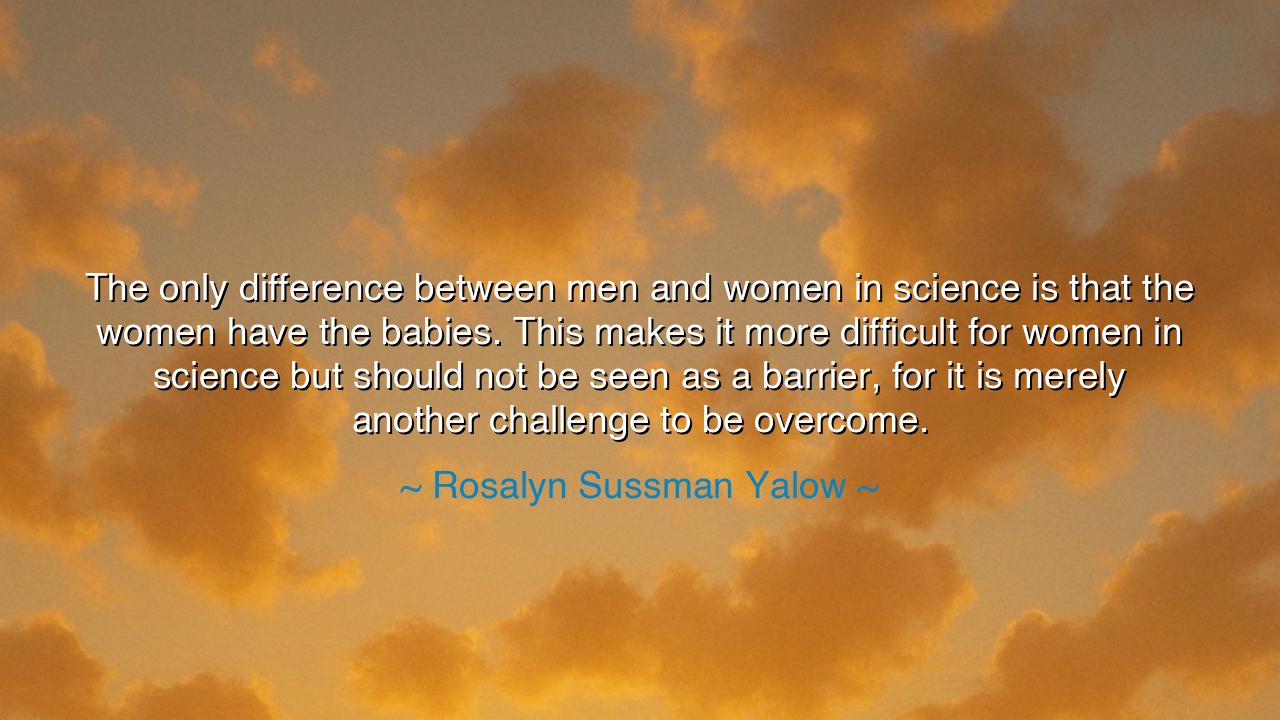
The only difference between men and women in science is that the
The only difference between men and women in science is that the women have the babies. This makes it more difficult for women in science but should not be seen as a barrier, for it is merely another challenge to be overcome.






Listen, O seekers of wisdom, to the words of Rosalyn Sussman Yalow, whose insight carries the weight of experience and the courage of a true pioneer in the realm of science: "The only difference between men and women in science is that the women have the babies. This makes it more difficult for women in science but should not be seen as a barrier, for it is merely another challenge to be overcome." These words speak not only to the realities of the scientific world but to the very heart of what it means to face adversity, to overcome the challenges that life presents, and to rise above them with strength and resolve. Yalow understood deeply the struggle that many women face in the pursuit of knowledge, but she also recognized that such challenges need not be seen as insurmountable barriers, but as opportunities for growth and perseverance.
In ancient times, too, there were those who faced the weight of their circumstances and yet rose to greatness. Hypatia, a philosopher and mathematician in ancient Alexandria, lived in a world where women were often excluded from the higher intellectual pursuits. Yet, she defied the constraints of her time, teaching mathematics, astronomy, and philosophy to all who sought knowledge. Her brilliance shone through the darkness of gender bias, and though history has often obscured her name, her legacy remains as a testament to the power of perseverance against the obstacles imposed by society. Similarly, Yalow speaks to this universal truth: that even in the face of societal constraints, one can still carve out a path to excellence.
Consider, O wise ones, the struggles faced by Marie Curie, the only person ever to win Nobel Prizes in two different fields—Physics and Chemistry. Curie, too, balanced the demands of motherhood with the pursuit of science. She did not allow the burdens of being both a mother and a scientist to define her limitations, but rather used them as fuel for her tireless work. The challenges that women in science face—be it motherhood, societal expectations, or lack of support—do not diminish their ability to achieve greatness. Rather, these challenges become stepping stones that, when met with resilience and determination, only sharpen one’s resolve and creativity.
Yalow’s words remind us that the true difference between men and women in science is not a matter of intellect or capability, but of the different paths they walk. For women, the path may be more difficult, but it is no less worthy or capable of leading to profound discoveries. The key here is the mindset with which we approach the challenge. Women in science, like Yalow, refuse to let the natural course of life—such as motherhood—become a barrier to their ambitions. They see it not as an obstacle but as a challenge to be faced with wisdom, strength, and innovation. In every challenge, there is the potential for growth, and in every difficulty, there lies the opportunity to create something new and powerful.
This wisdom calls upon us to rethink how we view the challenges in our own lives. How often do we face obstacles—whether in science, in work, or in life—and allow them to define us? We must understand that these obstacles, whether they be gender-based, societal, or personal, are not the barriers we often believe them to be. They are the tests that forge our strength, the challenges that shape our destiny, and the opportunities to show the world what we are truly capable of. Yalow teaches us that adversity, far from limiting us, is a force that can propel us forward when met with perseverance.
Let us turn to the great women of science who have come before us—Rosalind Franklin, whose work in the discovery of the DNA double helix was key but long overlooked, and Dorothy Hodgkin, who overcame both gender bias and physical disability to win the Nobel Prize in Chemistry. These women did not let the weight of their circumstances define their contributions; they saw their challenges as stepping stones, knowing that the greatest discoveries often come from those who must work hardest to break down the barriers before them.
Thus, the lesson is clear, O seekers: it is not the challenges we face that define us, but the way we face them. Just as Yalow saw the challenge of motherhood not as an obstacle but as a part of her journey in science, so must we see our own struggles not as barriers but as the tests that forge our strength. Whether you are a woman in science, a student in learning, or an individual striving for greatness in any field, the obstacles you encounter are not the end of your path. They are merely part of the journey that will shape you into something stronger, something greater.
So, O wise ones, let us embrace the challenges that life presents us, whether they come in the form of gender bias, societal expectations, or personal setbacks. Let us rise to meet them with resilience, knowing that they are not barriers, but opportunities to grow, to create, and to leave our mark on the world. Just as Yalow and so many other great minds did, we too can take the challenges before us and turn them into stepping stones toward our greatest achievements. Let this be our legacy: not to be defined by the obstacles we face, but by the strength with which we overcome them.






AAdministratorAdministrator
Welcome, honored guests. Please leave a comment, we will respond soon